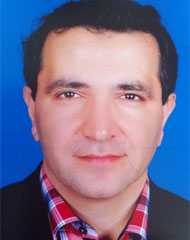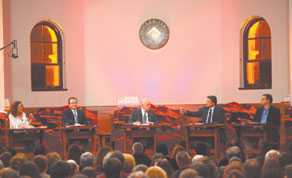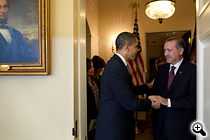By Turan Kayaoglu
 The Turkish foreign policy elite have updated the country’s foreign policy vision for the Middle East: Turkey will now promote democracy and human rights there. While this is a lofty objective, Turkey is both intellectually and politically ill-equipped for it.
The Turkish foreign policy elite have updated the country’s foreign policy vision for the Middle East: Turkey will now promote democracy and human rights there. While this is a lofty objective, Turkey is both intellectually and politically ill-equipped for it.
Until the advent of the Arab Spring, Turkey’s Justice and Development Party (JDP) followed a “zero problems” policy towards its neighbors in the region. Turkey’s dynamic economy (17th largest in the world) and pro-Palestinian stance, combined with the JDP leaders’ overt religiosity and the popularity of Turkish soap operas, made Turkey a power to be reckoned with in the Middle East. Buoyed by this success, Turkey began attempting, with varying success, to solve its decades-old regional issues.
Until recently, Turkish leaders had not hesitated to cozy up to Middle Eastern autocrats as a way to pursue better relations. The Arab Spring changed all of that, and forced Turkey to side with the streets against the palaces and shelve its “zero problems” policy.
Turkey’s new foreign policy framework responds to the conundrum presented by the popular uprisings throughout the region by altering its focus. In a recent policy brief published for the Turkish Ministry of Foreign Affairs’ Center For Strategic Research, Tarık Oğuzlu calls the new approach “Version 2.0 of Turkey’s ‘Zero Problems With Neighbors’ policy.” He argues that, driven mostly by normative and humanitarian concerns, Turkey will now strive to have zero problems not necessarily with the governments of neighboring countries but with its people. Oğuzlu hopes that “the years ahead will witness a ‘democratic touch’ in Turkish foreign policy in the Middle East, reflecting the spirit of Turkey’s liberal democratization process already underway at home.”
Moreover, in a separate policy brief published in April, Foreign Minister Ahmet Davutoğlu details what he calls ‘Turkey’s vision-oriented foreign policy.’ He elaborates: “we will not keep silent on oppression by autocratic leaders and will act in tandem with the international community to end it”; “we will not take steps that will alienate us from the hearts and minds of our region’s people;” and “we will work towards the establishment of a more peaceful and prosperous regional order and support people’s quest for basic human rights and democracy.”
However, Turkey lacks the intellectual and political capital necessary to promote human rights and democracy in the region. Unlike the “zero problems” policy which Turkey earlier relied on its economic power, Version 2.0, would have Turkey rely on soft power. Harnessing the power of persuasion requires in-depth knowledge of the complexities of Middle East politics. The Turkish elite’s post-Ottoman neglect of the region and its later reliance on the Cold War categorizations has left Turkey ill-equipped to know the region’s peoples, histories, and true concerns. Apart from those who learn classical Arabic for religious reasons, few Turkish intellectuals understand Arabic, with the overwhelming majority relying exclusively on Anglo-American sources for information on the Middle East.
Ideological certainties have often substituted for critical scholarship when it comes to the Middle East. Salvaging Western writings for ideological ammunition, Turkish secularists quickly attribute the region’s problems to its lack of an Atatürk, while pro-Islamic conservatives (and leftists) blame Western imperialism for troubles in the Middle East. What’s worse, a wide range of Turkish society enjoys Arab countries’ troubles as these are seen as divine retribution for the Arab revolts against the Ottoman Empire.
Turkish foreign policy think tanks, which have mushroomed in the country under the JDP’s rule, offer little help in correcting these flaws. Many bought into the JDP’s grandiose image of Turkey’s regional leadership, and for the most part, have quickly given credit to the government for foreign policy successes and blamed external factors for any failures. Without a serious critical self-reflection and analysis of the region, Turkey will not be able to lead the region to democracy and human rights.
If that wasn’t enough, Turkey’s own democratic and human rights shortcomings offer an even bigger reason for why it is ill-equipped for such a role. Admittedly, since coming to power in 2002, the government has improved many aspects of Turkish democracy, such as civilian control over the army and the expansion of Kurdish rights—but these are not enough. Additional legitimate Kurdish demands continue to fall on deaf ears. The 216th Article of the Turkish Penal Code (TCK), which bans “fomenting hatred and enmity among the public” and “insulting religious values,” continue to be used to silence dissidents and critics of Islam. The U.S. Commission on International Religious Freedom in its 2012 Annual Report controversially categorized Turkey as a “Country of Particular Concern” for religious freedom, a category reserved for the worst.
International assessments of Turkish democracy and human rights reveal a disturbing picture. The Economist Intelligence Unit’s 2011 Democracy Index ranks Turkey 88th out of 167 countries, while the Global Economic Forum’s 2011 Global Gender Gap Index ranks Turkey as 122nd out of 135 countries. According to Freedom House, while political rights and civil liberties in Turkey improved under the JDP, Turkey is still a partially free country. These rankings are not indicators for a promoter of democracy and human rights. Turkey is just not in a position to credibly portray itself as a regional leader on these issues.
This is not to say that Turkey cannot eventually show leadership in enhancing democracy and promoting human rights in the region. Such leadership is deeply needed and Turks have much to offer in terms of moderation, modernization and secularization, if not outright democratization. However, foreign policy elites should heed Atatürk’s famous dictum, which is paraphrased as: “democracy at home; democracy in the world.” Putting one’s house in order should precede promoting democracy and human rights abroad.
(Turan Kayaoglu is a Brookings Doha Center – Qatar University Visiting Fellow in Doha, Qatar. He is an associate professor of International Relations at the University of Washington, Tacoma.)





